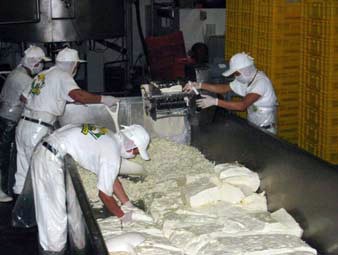
Like many Salvadoran family owned milk processing operations, Agroindustrias San Julián, S. A. de C. V. in Sonsonate, El Salvador, used to collect its milk from local farms in un-refrigerated trucks which resulted in poor quality, high losses and minimal environmental controls. The company’s president, Luis Fernández, knew that with the passage of the U.S.-Central America-Dominican Republic Free Trade Agreement (CAFTA-DR) his company would have to modernize in order to meet international standards and be able to grow and stay competitive.
Fernández decided to reach out to the El Salvador Clean Production Center for help. With assistance from USAID, the Center conducted a thorough technical and environmental analysis of the company’s facility and presented it with different options for expanding and modernizing its dairy processing plant. Working hand-in-hand with the Center and Banco Cuscatlan (now Citibank de El Salvador), which has a 50 percent development credit loan guarantee from USAID for clean production projects, Fernández was able to put together a $300,000 financial loan package and technical assistance from the Bank that allowed him to not only modernize his plant but also build a waste water treatment facility required by the Ministry of Environment as a result of the environmental impact assessment.
With the loan from Citibank, combined with a second low-interest loan from the government-sponsored Agriculture Development Trust Fund, Agroindustrias San Julián was able to invest on clean production processes. This included: a new filtration and separation system for the milk serum, which the company now uses to feed pigs and develop other products; a wastewater treatment plant that can handle 40,000 liters per day; a new, more energy efficient gas boiler; refrigerated tanker trucks of different sizes to reach the smaller farmers and cooperatives located in hard to reach rural communities; and a 30,000-liter refrigerated holding tank. Agroindustrias San Julián is now certified by the U.S. Food and Drug Administration.
As a result of its investments, the company calculates it has saved over $250,000 in electricity and other savings in raw materials over the past three years, which has paid off all investment costs. Fernández is working diligently to reach out to dairy farmers to promote best practices and environmental and social stewardship. Despite modernization, the company has been able to retain all 320 employees through continuous job training.
Under its CAFTA-DR environmental cooperation, USAID is now working with the Central American Commission for Environment and Development, the Clean Production Center and the Ministries of Environment and Agriculture to promote voluntary clean production agreements with different economic sectors to comply with laws and promote greater corporate social and environmental responsibility.







Comment
Make a general inquiry or suggest an improvement.